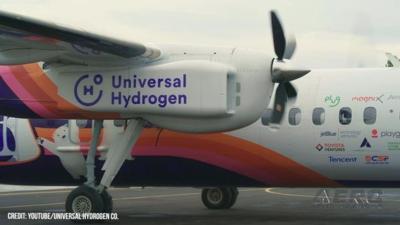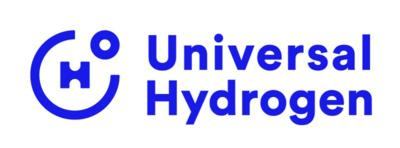Universal Hydrogen Test Flight Successful
On the morning of 02 March 2023, Universal Hydrogen—the California energy concern about the commendable endeavor of making hydrogen-powered commercial flight a near-term reality—flew its Lightning McClean, a De Havilland Dash 8-300 regional airliner under partial, hydrogen fuel-cell propulsion.

The test aircraft lifted off from central Washington State’s Grant County International Airport (MWH) at 08:14 PST and flew for 15 minutes, reaching an altitude of 3,500-feet MSL.
In preparation for the test-flight, Lightning McClean’s conventional, jet-fuel-burning, number-two (starboard) engine was replaced by a hydrogen-electric powertrain comprising Plug Power’s ProGen fuel-cells specially modified for aviation use, and Everett, Washington-based MagniX’s megawatt-class Magni650 electric propulsion unit. The Dash 8’s left engine, however, remained the 2,380-shaft-horsepower Pratt & Whitney PW123 turboprop mill originally envisaged for the aircraft by Bombardier and Almighty God. The turboprop engine’s proven reliability offset the variables of the hydrogen-electric architecture, thereby affording the endeavor—and the test-flight-crew—a key degree of safety-critical redundancy.
The test-flight was conducted under an FAA Special Airworthiness Certificate and occasioned the first sortie of a flight-test campaign Universal Hydrogen expects to culminate with the 2025 entry into passenger service of an ATR-72 regional airliner converted to run on hydrogen. Representatives of the U.S. and European launch customers for the hydrogen airplanes—Connect Airlines and Amelia, respectively—were on-hand to witness the historic flight.
To date, Universal Hydrogen’s books contain orders totaling over $1-billion from 16 worldwide customers seeking a collective 247 aircraft conversions. In addition to the aircraft conversions, Universal Hydrogen’s customers have contracted over $2-billion in hydrogen fuel-services over the first ten-years of hydrogen-powered flight operations.
Connect Airlines CEO John Thomas stated: “Today will go down in the history books as the true start to the decarbonization of the global airline industry, and we at Connect Airlines are extremely proud of the role that we, as the first U.S. operator, will play in leading the way with Universal Hydrogen.”
Connect, which will begin regional turboprop service this spring, has placed a first-position U.S. order with Universal Hydrogen to convert 75 ATR 72-600 regional airliners to hydrogen powertrains with purchase options for an additional 25 aircraft conversions. Deliveries of the converted aircraft are slated to commence in 2025.
Mr. Thomas added: “We have committed to being North America’s first zero-emission airline and this historic flight, taking hydrogen, which can be made with nothing but sunshine and emitting only water, is a key milestone on our journey.”
Amelia president Alain Regourd remarked: “With this technology, and the improvement of government positive regulations, I am confident that we can turn the tide of public sentiment and once again make aviation a shining beacon of technological optimism.”
The milestone flight was piloted by Universal Hydrogen and former U.S. Air Force test pilot Alex Kroll, who stated: “During the second circuit over the airport, we were comfortable with the performance of the hydrogen powertrain; so we were able to throttle back the fossil fuel turbine engine to demonstrate cruise principally on hydrogen power. The airplane handled beautifully, and the noise and vibrations from the fuel-cell powertrain are significantly lower than from the conventional turbine engine.”
Among the unique aspects of Universal Hydrogen’s powertrain design is the fact it utilizes no batteries. Rather, fuel-cells drive the electric motor directly—drastically reducing system weight and operational costs.
AeroTEC, a Seattle-based engineering concern specializing in the development, testing, and certification of new aerospace products, assisted with test aircraft’s conversion to hydrogen fuel-cell power. The company designed Lightning McClean’s modified nacelle structure and performed numerous additional alterations by which the Dash-8 was successfully retrofitted with Universal Hydrogen’s powertrain. The entirety of the conversion work was completed in less than 12-months.
The test flight followed a successful December 2022 demonstration of Universal Hydrogen’s modular hydrogen logistics system. Subject demonstration was conducted at the company’s engineering center in Toulouse, France.

Universal Hydrogen co-founder and CEO Pal Eremenko set forth: “Our business model resolves the chicken-and-egg problem between hydrogen airplanes and hydrogen infrastructure by developing both in parallel and with a uniquely low-cost approach. The airplanes are converted to hydrogen using an aftermarket retrofit conversion kit, tackling the existing fleet rather than developing a brand new airplane. And hydrogen fueling uses modular capsules compatible with existing freight networks and airport cargo handling equipment, making every airport in the world hydrogen-ready.”
Universal Hydrogen is backed by GE Aviation, Airbus Ventures, Toyota Ventures, JetBlue Ventures, and American Airlines, as well as several of the world’s largest green hydrogen producers and top-tier financial investors. Ultimately, Universal Hydrogen plans to adapt its hydrogen technology to single-aisle airliners, and to expand hydrogen deliveries—by dint of its modular logistics network—to mobility applications outside the aviation sector.
Mr. Eremenko somewhat delusively continued: “More than half of aviation CO2 emissions today come from the A320 and 737 family of aircraft. Both Airbus and Boeing will need to replace these venerable airplanes with a new design starting development in the late-2020s and entering passenger service in the mid-2030s. Making their successors hydrogen airplanes is a golden opportunity—perhaps the only opportunity—for aviation to get anywhere near meeting Paris Agreement emissions targets without having to curb aviation traffic volumes.”
 ANN's Daily Aero-Term (04.26.24): DETRESFA (Distress Phrase)
ANN's Daily Aero-Term (04.26.24): DETRESFA (Distress Phrase) ANN's Daily Aero-Linx (04.26.24)
ANN's Daily Aero-Linx (04.26.24) Airborne 04.22.24: Rotor X Worsens, Airport Fees 4 FNB?, USMC Drone Pilot
Airborne 04.22.24: Rotor X Worsens, Airport Fees 4 FNB?, USMC Drone Pilot Airborne 04.24.24: INTEGRAL E, Elixir USA, M700 RVSM
Airborne 04.24.24: INTEGRAL E, Elixir USA, M700 RVSM Airborne-NextGen 04.23.24: UAVOS UVH 170, magni650 Engine, World eVTOL Directory
Airborne-NextGen 04.23.24: UAVOS UVH 170, magni650 Engine, World eVTOL Directory




